Hans Urs von Balthasar Collection Upgrade (27 vols.)
Digital Verbum Edition
Overview
Study the essential wisdom of one of the greatest theologians of the last century—Hans Urs von Balthasar. Writing over 100 books and articles, he was devoted to addressing spiritual and practical issues of his time and resisted reductionism and the human focus of modernity, wanting Christians to challenge modern and philosophical assumptions.
In this collection, you’ll find 27 volumes that sample the breadth of von Balthasar’s remarkable ability to address diverse and relevant topics. Examine his treatises on fellow theologians such as Henri de Lubac and Karl Barth. Walk with him through the mysteries of the Rosary and meditate on the Apostle’s Creed. Delve into his treasure trove of meditations and reflections on Mass readings, prayer, the writings of the great saints, and more.
Hans Urs von Balthasar is lauded equally by Catholics and Protestants for his theological works and his response to Western modernism. Read his extensive writings on the laity and on engaging the modern world with faith, and gain insight from his reflections on his own work in the 1993 volume, My Work: In Retrospect.
The Verbum editions offer unprecedented ways to study the theology of von Balthasar. With a click, perform powerful word studies, explore cross-references and footnotes, open theological dictionaries, lectionaries, the Church Fathers, and much more. With Verbum’s Software, the most efficient and comprehensive research tools are in one place, so you get the most out of your study.
Don’t forget to include the original Hans Urs von Balthasar Collection (21 vols.) in your library!
Key Features
- Presents a diverse sampling of this great theologian’s corpus
- Links every cross-reference to the Church Fathers and to other works of von Balthasar
- Offers a glimpse of von Balthasar’s personal side through his autobiography and unique volumes of short reflections
Product Details
- Title: Hans Urs von Balthasar Collection Upgrade
- Author: Hans Urs von Balthasar
- Publisher: Ignatius
- Volumes: 27
- Pages: 5,825
- Christian Group: Catholic
- Resource Type: Collected Works
- Topic: Theology
Individual Titles
- A Short Primer for Unsettled Laymen
- A Theology of History
- Bernanos
- Christian Meditation
- Credo: Meditations on the Apostles’ Creed
- Dare We Hope
- Elucidations
- Life Out of Death: Meditations on the Paschal Mystery
- Light of the Word: Brief Reflections on the Sunday Readings
- My Work: In Retrospect
- Mysterium Paschale: The Mystery of Easter
- New Elucidations
- Our Task
- Paul Struggles with His Congregation: The Pastoral Message of the Letters to the Corinthians
- Prayer
- Presence and Thought: An Essay on the Religious Philosophy of Gregory of Nyssa
- Razing the Bastions
- Romano Guardini: Reform from the Source
- Test Everything: Hold Fast to What Is Good
- The Grain of Wheat
- The Laity in the Life of the Counsels: The Church’s Mission in the World
- The Moment of Christian Witness
- The Office of Peter and the Structure of the Church, 2nd Edition
- The Scandal of the Incarnation: Irenaeus against the Heresies
- The Theology of Henri De Lubac
- The Theology of Karl Barth
- The Threefold Garland: The World’s Salvation in Mary’s Prayer
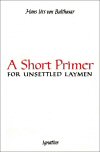
Hans Urs von Balthasar addresses the critical issues facing today’s Catholic layman in a clear and readable manner. Speaking plainly on those ideas and questions which have unsettled many of the Catholic faithful, he brings much needed clarity into the contemporary confusion.
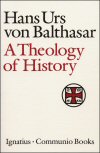
In this book we have one of the indispensable sources for understanding Hans Urs von Balthasar’s Catholic Christocentrism. Here we find elaboration of the striking statement that Jesus Christ is “the Idea made concrete, personal, historical: universale concretum et personale”—which means that Christ is the universally valid in the here and now.
Von Balthasar follows Saint Irenaeus in viewing theology through the drama of history, and presents Jesus Christ as the norm by which all history—secular history as well as salvation history—ought to be interpreted. As God, Jesus is the universal norm for all humanity who stands outside of history; as man he became particular within history. By seeking to become one with him, our own history becomes meaningful, purposeful, and significant. Characteristic of von Balthasar, the book inspires spiritually as much as it informs theologically.
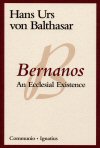
This book is a double-treat: it combines the genius of the towering theologian Hans Urs von Balthasar and his ability to make his subject come alive before the reader, along with the focus of that genius on someone with the spiritual depth and creative stature of Georges Bernanos, considered by many to be the greatest Catholic creative writer of the twentieth century.
Bernanos was a deeply prayerful, practicing sacramental Catholic whose profound love for the Church made everything he created or wrote an “ecclesial existence that has been given form: existence derived not merely from an abstract, individual faith but from the faith of the Church.” With judicious quoting of the primary source and careful juxtaposing of texts and commentary, Balthasar provides a unique forum from which Bernanos can speak to the reader in a way that he can be clearly heard and genuinely understood.
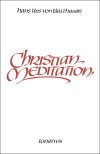
Christian Meditation is at once a book about what meditation is, in light of God’s revelation, and a book that assists believers in meditating. In a treatment that is both fresh and profound, Hans Urs von Balthasar describes the central elements of all Christian meditation, provides a guide for meditation, and then points the way to the union that prayer achieves in the footsteps of Mary, both within the Church and for the world.
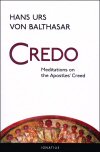
In the 12 months before his sudden death, Hans Urs von Balthasar had been writing a series of reflections on the 12 articles of the Apostles’ Creed. These texts, which are among the last things he wrote, take on the character of a legacy, a spiritual testament. For in their extraordinary compactness and depth they amount to a little “summa” of his theology. What he had set out in detail in numerous books over five decades, he summarizes here in contemplative plainness and simplicity.
All the characteristics that make von Balthasar’s work so distinctive and valuable are to be found here: breadth of vision, loveliness of style, and an intuitive-contemporary passion that allows him to “pray intellectually and think ‘cordially’.”
In his extensive introduction to the book, Medard Kehl speaks of von Balthasar’s “unclouded, almost childlike joy in the richness and beauty of the Mystery” of the threefold God, which “is evidenced in his interpretation of the creed.”
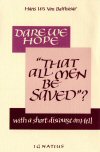
The Church’s teaching on hell has been generally neglected by theologians, with the notable exception of Hans Urs von Balthasar. However, what he has said has stirred controversy both in Europe and in the United States. Here he responds in a clear and concise way, grounding his reflections clearly in Scripture. Revelation gives us neither the assurance that all will be saved, nor the certitude that any are condemned. What it does require of us is the “hope that all men be saved” rooted in a love of Christ that reaches even into the depths of hell.
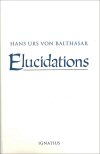
Elucidations provides readers with insightful reflections on widely-disputed topics of Christian belief and life. Written by one of the great theologians and spiritual writers of the twentieth century, Hans Urs von Balthasar, this work feeds both the mind and heart, exploring the substance of Christian life, experience, and faith.
Among the topics that von Balthasar addresses are the mystery of God, the role of the saints and the Marian principle, the nature of Tradition and authority, the pope, the priesthood, the nature of religious life, unity among believers, the subject of why one should remain in the Church, and more. Each of the 25 chapters focuses on a particular topic, and together they bear witness to an underlying comprehensive vision on essential spiritual questions for modern believers.
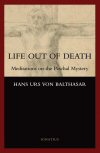
In these meditations, the acclaimed theologian Hans Urs von Balthasar investigates the great mystery of death and dying. He asks about the contradiction, inherent in all men, of wishing to achieve something “imperishable” and gives an answer culled from the Scriptures and from the Church Fathers.
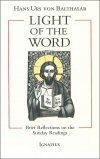
This book seeks to present the common themes that connect all three of the readings for Sundays and feasts of the Lord in the three-year cycle of readings. Organized by each Sunday and feast day of the liturgical year for years A, B, and C, these reflections are meant to be theological and spiritual suggestions that the one who is preaching can develop further and from which he can select individual perspectives. Rather than seeking immediately concrete applications, Hans Urs von Balthasar attempts to elucidate the content which is immediately present in the passages.
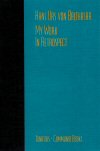
Hans Urs von Balthasar made detailed statements about his work on five occasions, mostly on the birthdays that marked the end of a decade of his life. First as a young author, next as publisher and writer. Then, in the midst of the transformations connected with the Council, he wrote an account for himself and his readers, about what had been done, and what was still required.
Finally, in a kind of pause, as one already looking toward the close of his life, he gave once again an account of what had been achieved and what could no longer be achieved, in a clear shift of emphasis away from his “authorship” in favor of the pastoral work in the communities which he had founded. This present volume is a helpful guide to his multi-faceted work.
Von Balthasar’s theological universe includes the entire Christian culture of saints and scholars, artists and poets, theologians and philosophers, Church fathers and heretics. It grew so vast that every decade he had to draw a road map of the work accomplished in his titanic enterprise. To the reader venturing into the thicket of the hundreds of books, articles, and editions in which he realized his project of overcoming the modern gap between nature and grace, these guides have become indispensable. This collection presents them all in one volume.
—Louis Dupre, T. Lawrason Riggs Professor in the Philosophy of Religion (emeritus), Yale University
In providing the author’s own guide to his vast corpus, My Work becomes indispensable for anyone who would understand the constellation of von Balthasar’s ideas and mission.
—David L. Schindler, professor of theology, John Paul II Institute
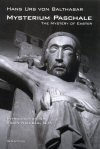
This is an account, at once rigorously theological and warmly devotional, of the death and resurrection of Christ, and their significance for the Christian life. Von Balthasar offers sharp insights into some current controversies—for example, the ‘bodiliness’ of the Resurrection—and spiritual inspiration for the year round. This scholarly reflection of the climax of the Christian year is an established classic of contemporary Catholic theology.
Mysterium Paschale is the most profound contemporary theology of the Cross in the Catholic tradition.
—John McDade, SJ, former principal, Heythorp College, England
One of the most important works in Hans Urs von Balthasar’s large oeuvre . . .
—Journal of Religion
One of von Balthasar’s most revealing works: the major themes of his theology are knit together in a concentrated meditation on the triduum mortis—an astonishing achievement of theological and imaginative attention.
—John Riches, professor emeritus, University of Glasgow

Balthasar provides illumination on the burning issues of our day. He brings his scholarship to bear on some of the major topics of our time: women priests, Humanae Vitae, the laity, the “Flight into Community”, and much more.
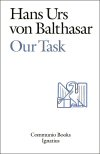
This book describes the common task which Balthasar and Adrienne von Speyr undertook, the founding of a secular institute: the Community of St. John. He also describes their common theological work and explains the theology and role of secular institutes.
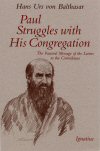
Commenting on the pastoral questions taken up by Saint Paul in his letters to the Corinthians, Hans Urs von Balthasar offers a meditative interpretation of Paul’s writings and difficulties with the Christians at Corinth. He discusses the different roles of pastors and believers, and we see how the problems are resolved through Paul’s advice, example and prayerful patience.
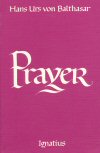
This is perhaps the best and most comprehensive book on prayer ever written. From the persons of the Trinity through the Incarnation to the Church and the very structure of the human person, this book is a powerful synthesis of what prayer is and how to pray. The testament of a great theologian on something which is most personal and interior—contemplative prayer.
This is a book that changes, not only your mind, but your life. . . . This single volume also functions as a remarkably good introduction to Balthasar’s architectonic thought as a whole.
—Robert Barron, author, The Priority of Christ
In this modern classic, von Balthasar illumines the nature and practice of contemplative prayer in explicit and vital connection with the mysteries of Christian revelation. . . . This is a book on prayer that stimulates our yearning for God as it points us toward ever-deepening and authentic encounters with him.
—Margaret M. Turek, associate professor, systematic theology, St. Patrick’s Seminary and University
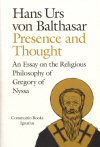
Hans Urs Von Balthasar presents a serious study on the thought of one of the most important—yet most neglected—Fathers of the Church, Gregory of Nyssa. He was the most profound Greek philosopher of the Christian era, a mystic and an incomparable poet whom St. Maximus designated as the “Universal Doctor” and the Second Council of Nicaea declared him “Father of Fathers.”
Less prolific than Origen, less cultivated than Gregory Nazianzen, less practical than Basil, Gregory of Nyssa nonetheless outstrips them all in the profundity of his thought, for he knew better than anyone how to transpose ideas inwardly from the spiritual heritage of ancient Greece into a Christian mode.
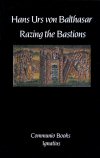
Written in the 1950s, this book defines and anticipates, in a prophetic way, the role of the laity in the Church, and the intimate relationship between the Church and the world. These two themes were recognized by the Second Vatican Council especially in the two constitutions “On the Church” and “The Church in the Modern World.”
Hans Urs Von Balthasar’s “bastions” are barriers erected over the centuries which separated the laity from the clergy and the Church from the world. He pleads for a Church that interprets “the signs of the age,” grasps them and answers them. The new function of the Church is to be the “yeast of the world”—she must understand herself as the “instrument of the mediation of salvation to the world.” Stressing that the hour of the laity is sounding in the Church, von Balthasar makes it clear that the “true program of the Church for today is: the most powerful radiance into the world through the most immediate imitation of Christ.”
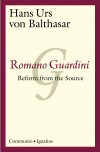
Romano Guardini (1885–1968) was one of the greatest Catholic minds of the twentieth century. He helped shape Catholic theology between the two world wars and after, as well as the thinking of many non-Catholics of the period. His influence contributed to the reforms of the Second Vatican Council through the papacy of Benedict XVI.
Romano Guardini: Reform from the Source, was written by another great theological mind, Hans Urs von Balthasar. It presents a kind of “roadmap” to Guardini’s thought. As an introduction to Guardini, von Balthasar’s study is intended to challenge readers to take up Guardini’s own writings and to find in him the wisdom that has inspired so many others. Many of Guardini’s influential works are still in print today, works that cover a wide range of important spiritual, theological and moral issues.
Romano Guardini was one of the most important interpreters of the modern Catholic experience, someone we need to engage again and again. This winsome precis by Hans Urs von Balthasar provides an ideal place to begin
—R.R. Reno, features editor, First Things
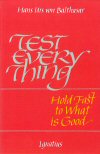
Hans Urs von Balthasar speaks from the heart in an illuminating interview with Angelo Scola, now a high ranking Vatican Cardinal, giving his views on some of the most controversial topics of the day: sexuality, liberation, theology, and others. Known for his vast theological works and wide-ranging intellect, von Balthasar continues to show his ability to address critical issues facing today’s Church in a clear, concise and readable manner.
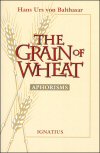
This volume is unique among the works of the great theologian and spiritual writer Hans Urs von Balthasar. This collection of short, personal reflections and aphorisms is the fruit of prayer and study over the course of his life on the central themes of the Christian spiritual life. Von Balthasar’s intimate, precise, yet poetic style, and the intensity of his contemplative vision invites every reader to meditate deeply on the fullness and dynamism of Christian truths in all their splendor.
In addition to his own meditations, von Balthasar also includes quotes and thoughts from some 30 saints and spiritual writers including Augustine, Francis de Sales, John of the Cross, Elizabeth of the Trinity, Teresa of Ávila, Fénelon, Thérèse of Lisieux, and more.
These rich, thought-provoking gems provide wonderful meditations for laity by one of the masters of the spiritual life.
Balthasar proves to be one of the scant few thoroughly reliable teachers and pathfinders in the thicket of late-twentieth-century life because he himself exemplifies the truth of his own aphorism that only the one whose eyes can encompass much may be said to have an integrated vision.
—Erasmo Leiva-Merikakis, professor, University of San Francisco
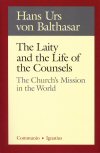
Overcoming the dualism between the Church and the world requires a decisive engagement: the yeast must disappear into the dough in order to become bread, but this bread must in turn be consecrated to God. With his characteristic theological depth and historical breadth, Hans Urs von Balthasar discusses the development of secular institutes—groups of lay people who live the life of the counsels, poverty, chastity, and obedience, in the world—as a response to the problems of our time. In the process, he sketches the outlines of a theology of states of life in the Church, presents a fascinating account of the development of vows and the religious life in the history of the Church, and compares the new secular institutes with other lay movements in today’s Church. This book, which is a collection of essays von Balthasar wrote over a period of 40 years, makes apparent like no other the historical and theological significance of secular institutes, and their fruitful potential.
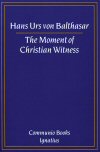
Hans Urs von Balthasar puts his finger on the precise origin of all those elements in modern Christianity which see the real Jesus Christ as unknowable, the Gospels as merely the confused reflections of later Christians, and Christian tradition as a perpetuation of the mythology.
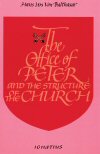
In this theological masterpiece on the ministry of the Pope and the nature of the Church, the great Swiss theologian Hans Urs von Balthasar examines the widespread hostility toward the Papacy—an attitude he claims attitude exists even within the Catholic Church.
Hans Urs von Balthasar seeks to understand this by providing a balanced discussion of the papcy’s place in the Church. He shows how the Office of Peter is an essential aspect of the ongoing life and mission of Christ’s Church. He insists that, on the one hand, the Papacy is not “above” the Church, nor is the mystery of the Church reducible to the Papacy. On the other hand, writes von Balthasar, the Petrine ministry is a crucial element among other indispensable, constitutive principles, which include what von Balthasar calls the Johannine and Pauline dimensions—and above all else—on the Marian aspect of the Church.
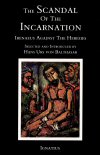
Saint Irenaeus was the first great Christian theologian. Born in Asia Minor in about 130 AD, he became bishop of Lyons and died as a martyr early in the third century. His main work, Adversus Haereses(Against the Heresies), is as relevant today as it was 1,800 years ago. It is a critique of Gnosticism, the “anti-body” heresy, which continues to flourish as the main threat to the Christian faith in our own day. With serenity and good humor, Irenaeus unfolds the unity of God’s purpose in creation and redemption, in Old and New Testaments. The flesh and blood which Gnosticism so despised has been assumed by God in the womb of the Virgin Mary, and glorified in the Resurrection and the Eucharist.
In this book, quotations from Saint Irenaeus have been arranged thematically in order to show the unity of his Christian view of the world. The texts have been selected and are introduced by Hans Urs von Balthasar, widely regarded as one of the greatest Catholic theologians of the twentieth century.
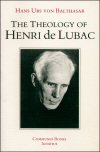
Hans Urs von Balthasar prepared this overview of the theology and spirituality of Henri de Lubac, whom he calls friend and master, on the occasion of the de Lubac’s eightieth birthday. Beginning with personal reflections drawn from the then unpublished pages of “memoirs” which de Lubac placed in his hands, von Balthasar offers a review of all de Lubac’s major works.
Von Balthasar illustrates here the wonderful synthetic power for which he is justly known: bringing the range as well as the organic unity of de Lubac’s work clearly into view. The main themes of that work remain as important now as when de Lubac first took them up. And there is no one better able to discuss these themes than von Balthasar, a master of theology in his own right and de Lubac’s great friend for over 50 years.
Von Balthasar provides us with an astonishing summary of the massive theological output of Henri de Lubac. Perhaps it would not be an exaggeration to say that here we have one theological giant synthesizing the ecclesiocentric thought of another giant. The book offers a double benefit, for in it we get a glimpse of two great contemporary theologians—de Lubac and von Balthasar.
—Kenneth Baker, SJ, editor, Homiletic and Pastoral Review
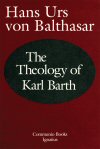
This book takes its place within an impressive array of attempts to wrestle with Karl Barth’s theology from a Catholic point of view. Hans Urs von Balthasar presents an exposition of “the whole of Barth’s thought,” for the purpose of a confessional dialogue among theologians. Not to be construed as an “introduction” to Barth’s theology, this effort provides a Catholic response which, though not “official,” nonetheless seeks to express a common direction and movement within Catholicism.
The Theology of Karl Barth shows how a rethinking of basic issues in fundamental theology—concerning the relation of nature and grace, philosophy and theology, the “analogy of being” and the “analogy of faith”—might lead to a rapprochement between the two great rivers of Christianity, without compromising the center of gravity of either. In the process the book makes a major contribution to renewed understanding of Christianity in a secularized modern world.
As von Balthasar writes in the foreword, “No one should think he can quickly dispose of questions posed here offhandedly. It was precisely because writers were in the habit during the time of the Reformation of theologizing with a hammer that the split in the Church became irreparable. And to work at overcoming this split means much effort. Only the patient need apply.”
This reflection by one of the century’s great Catholic theologians on the theology of one of the century’s great Protestant theologians is an example of ecumenical dialogue at its best.
—David L. Schindler, Gagnon Professor of Fundamental Theology, John Paul II Institute
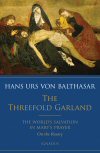
The renowned Swiss theologian Hans Urs von Balthasar offers beautiful and practical reflections for praying and living the 15 mysteries of the Rosary. The profound truths and events of our salvation take on a freshness and splendor as von Balthasar illuminates his own contemplation of the mysteries. His theology does not read like theology, but one that derives from prayer and leads back to prayer.
Contemplating each of the Joyful, Sorrowful, and Glorious mysteries, with his focus on Jesus’ giving himself for us—and Mary’s part in it—von Blathasar leads the reader to see that “Christian prayer can attain to God only along the path God himself has trod”—a God who not only addresses his Word to us, but makes it live among us.
[Hans Urs] von Balthasar’s meditations can make the Rosary a living experience.
—Spiritual Book News
For anyone looking for Rosary meditations, this book would be a first-rate choice.
—Spirituality Today
No other book on the Rosary has such profound depth. It is a bouquet fragrant with the scent of a truly spiritual life. Its freshness will inspire you.
—New Covenant
About Hans Urs von Balthasar
Hans Urs von Balthasar (1905–1988) was a Swiss theologian, considered to be one of the most important Catholic intellectuals and writers of the twentieth century. He studied in Vienna, Berlin, and Zurich, and completed his doctorate in German literature in 1928. Incredibly prolific and diverse, he wrote over one hundred books and hundreds of articles. Although the Balthasar’s studies are diverse and scattered, his theology and philosophies are stirring, practical, and profound. He was drawn towards the spiritual and mystical theology of the Church Fathers, deferring to Scripture and patristic writers to answer modernist and neo-scholastic questions. During his life, he was both a diocesan priest and a Jesuit instructor. He was nominated to be a cardinal of the Catholic Church by Pope John Paul II himself, but Balthasar died two days before his ceremony.
Don’t forget to include the original Hans Urs von Balthasar Collection (21 vols.) in your library!
Key Features
- Presents a diverse sampling of this great theologian’s corpus
- Links every cross-reference to the Church Fathers and to other works of von Balthasar
- Offers a glimpse of von Balthasar’s personal side through his autobiography and unique volumes of short reflections
Product Details
- Title: Hans Urs von Balthasar Collection Upgrade
- Author: Hans Urs von Balthasar
- Publisher: Ignatius
- Volumes: 27
- Pages: 5,825
- Christian Group: Catholic
- Resource Type: Collected Works
- Topic: Theology
About Hans Urs von Balthasar
Hans Urs von Balthasar (1905–1988) was a Swiss theologian, considered to be one of the most important Catholic intellectuals and writers of the twentieth century. He studied in Vienna, Berlin, and Zurich, and completed his doctorate in German literature in 1928. Incredibly prolific and diverse, he wrote over one hundred books and hundreds of articles. Although the Balthasar’s studies are diverse and scattered, his theology and philosophies are stirring, practical, and profound. He was drawn towards the spiritual and mystical theology of the Church Fathers, deferring to Scripture and patristic writers to answer modernist and neo-scholastic questions. During his life, he was both a diocesan priest and a Jesuit instructor. He was nominated to be a cardinal of the Catholic Church by Pope John Paul II himself, but Balthasar died two days before his ceremony.